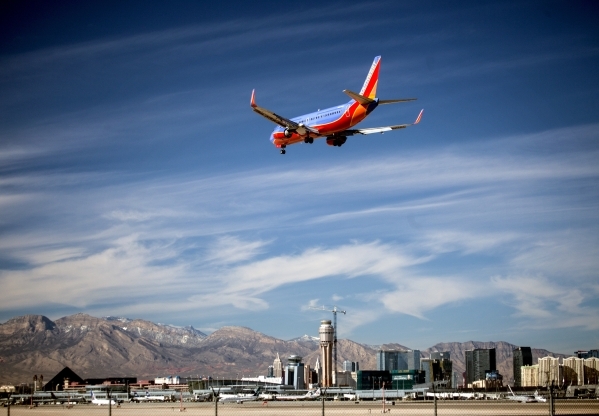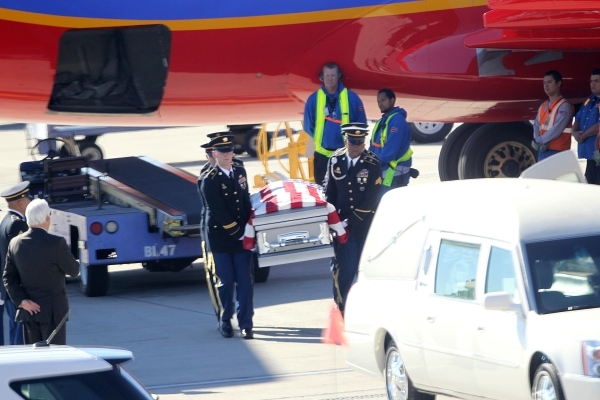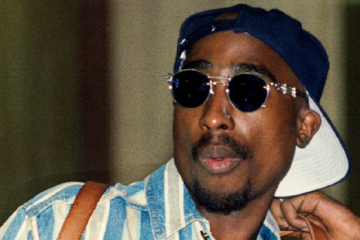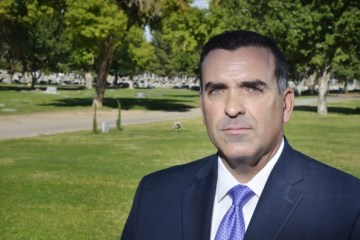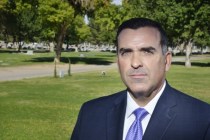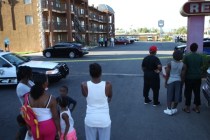When death takes a Vegas vacation
Las Vegas tourists always seem to smile through the slogan: "What happens here, stays here."
But when what happens here means dying, the grins fade to black.
Each year about 40 million people visit Las Vegas. In an average year, about 1,100 of them don't make it home alive. Most of them die of natural causes while here temporarily. And the rest fall victim to non-natural deaths, mostly accidents.
Statistics from the Clark County coroner's office say 67 percent of nonresident deaths in the past decade — 2,884 from Jan. 1, 2005, to Aug. 31 — resulted from accidents. They crash cars on unfamiliar streets and slip and fall in luxury hotel rooms. Some drown, but most are killed by what medical personnel call "blunt force trauma."
About 15 percent killed themselves while 11 percent were homicide victims. No cause could be determined for 6 percent of the deaths.
The statistical picture of death in Las Vegas isn't precise, however. Officials don't differentiate between a dentist on vacation from Cleveland and someone with an address outside of Clark County but in town for a business meeting — or a homeless person with no address all. They're all lumped together as nonresident deaths.
And the numbers include some who die before they even get here.
Although deaths on planes or in the terminal are rare, each of the 28 air carriers that serve McCarran International Airport and the airport itself have protocols for dealing with travelers who become sick or die en route.
The airlines don't like to talk about it. McCarran is a little more open.
"Most of the time, the flight deck is going to call the emergency in as a medical response," said Christine Crews, an airport spokeswoman.
Firefighters and paramedics from Clark County Fire Department Station 13 at the airport are usually the first to meet the plane. Because there are no medical personnel to declare a death in flight, emergency personnel treat all calls as medical emergencies.
If the passenger is gravely ill, they're taken off the plane first, and sometimes the plane will divert to a vacant gate where emergency medical personnel can help the passenger in an empty jetway as the plane taxis on to its scheduled arrival gate.
But when the passenger dies, the body remains on the plane until all other passengers depart. The Metropolitan Police Department is called in, and officers alert the Clark County coroner's office. Airport operations staff and custodians are notified of potential biohazards from bodily fluids. Grief counselors may be offered to any traveling companions.
Death on the Strip
Resort publicists who wax eloquently on the amenities of their properties suddenly get tongue-tied when asked how their companies respond to a death on their property. MGM Resorts International's reaction to a request for information about its procedures was typical:
No interview. Here's a statement: "Procedures in the unfortunate situation of a deceased guest are quite straightforward. Our security department summons paramedics and Metro police, which, in turn, contacts the Clark County coroner's office. Resort security supports these agencies' activities as appropriate."
Virginia Valentine, president of the Nevada Resort Association, said she thinks resort officials are reluctant to talk about death because it's so contrary to their purpose.
"Las Vegas resorts are associated with happiness, celebrations, anniversaries, 21st birthdays and coming here for a good time," she said. "It's a time of joy. (Death is) almost the exact opposite of what people come here to experience. Resort managers can't deal with being at the intersection of something sad and life-changing."
Resorts may be squeamish about the conversation, although Larry Davis, general manager of Palm Mortuary-Downtown, said many are at their best when they comfort friends or family of a guest who has died in one of their rooms.
"They're here on a weekend, they're here for fun, they're staying at one of the resorts. And then the husband has a heart attack. When that happens, the resort goes into action in taking care of the wife," Davis said. " 'Don't worry about your room. Don't worry about anything. We'll take care of you.'
"I've had (resort employees) drive them here to help make the arrangements, and I've been called to hotels by their management to help ... on some occasions."
Karie Hall, vice president and general manager of operations at Caesars Entertainment's Cromwell, a said resort reticence is mostly about respecting family privacy and staying out of police business, though she acknowledged that most resorts want to protect their image and preserve the "fun factor."
"We don't want to get too heavy," she said. "Most people come here to forget about their troubles and the situations they leave behind at home. One of our roles is to preserve that."
Not even fake deaths are welcome. When "CSI: Crime Scene Investigation," debuted, few resorts would let the the popular TV forensic-fest film on their properties. The exceptions included The Venetian and Caesars Palace, properties where Hall once worked, but she noted that most of CSI's resort-related murders happened at fictional casinos. Even regular establishing shots of the city carefully avoided showing anything recognizable on the Strip.
Stories about local media organizations colluding with resort operators to cover up unpleasant events and protect the major local industry are a staple of Vegas folklore, but that hasn't been true for years — if it ever was.
Former Review-Journal Publisher Sherman Frederick, himself a staple of Las Vegas media for three decades, said he never received a request from a resort company to spike a story of on-property death.
"I can tell you that if there were winks and nods going on between the resorts and the paper, it was taking place above my head," he said.
If anything, the resorts defer questions to police, who will say little or nothing because the death is classified as a pending investigation even if no crime is suspected.
Michael Hengel, the newspaper's editor since 2010, said he's heard tales of past efforts to quash coverage, but that "no one has ever asked me to not report a death, and I cannot imagine any circumstances that would make me grant such a request."
Urns Fly Free
As with all things in life, the death of a tourist in Las Vegas requires paperwork — a death certificate signed by an attending physician in the case of a natural death or by the coroner for accidents or homicides.
Relatives of visitors often will call mortuaries back home to handle arrangements, with locals such as Palm subcontracting for either embalming or cremation.
Davis said it usually takes three to five days to prepare a body and arrange transportation. He said Southwest Airlines, which dominates the Las Vegas market, gets most of the business. Embalmed bodies travel in the cargo hold in containers that are 7 feet by 30 inches, or in caskets 6 inches longer and wider. Most airlines limit the combined weight of remains and containers to 500 pounds.
Like all passengers, deceased travelers must arrive at the airport at least two hours before takeoff and go through security screening that includes an X-ray. The containers aren't opened, however.
International transports are much more complicated — so much so that mortuaries have a 5-pound publication called "The Red Book" that lists contact information for funeral homes worldwide, addresses and phone numbers for embassies and consulates and a list of each country's rules on the treatment and transport of bodies.
For Southwest, the process starts with arranging the best flight. Sometimes, that involves choosing a route that has the most appropriate aircraft to accommodate a casket. Southwest also has specialized equipment to slide remains from a hearse with minimal lifting, and it uses a dedicated, covered cart to transport and load remains with dignity.
"We treat the process with respect," said Mark Grigg, Southwest's director of cargo customer service. "No one wants to see their loved one loaded up with luggage or anything else."
Wally Devereaux, the airline's senior director of cargo and charters, couldn't say how many bodies pass through McCarran, but Las Vegas is among Southwest's top five stations in the category. Costs vary by distance. A Los Angeles flight is $350; New York-LaGuardia, $600. Domestic rates top out at $820.
Shipping cremated remains is much easier and much less expensive because urns, including those made of metal, can be carried on board, and the Transportation Security Administration has a special program to help.
Stephen Ward, a TSA supervisor at McCarran, said urns or boxes routinely pass through checkpoint scanners and then are screening by an officer who does not disturb the remains. The passenger is always in contact with the remains, and the secondary screening takes just 30 seconds, with a private room provided on request.
"The most important thing for us in situations like this is to take the time to be sensitive," Ward said. "We really want to relieve any concerns or anxiety."
Contact Richard N. Velotta at rvelotta@reviewjournal.com or 702-477-3893. Find him on Twitter: @RickVelotta
One sure bet: Death in Las Vegas



